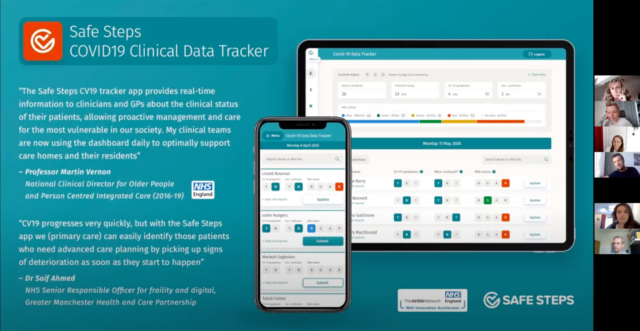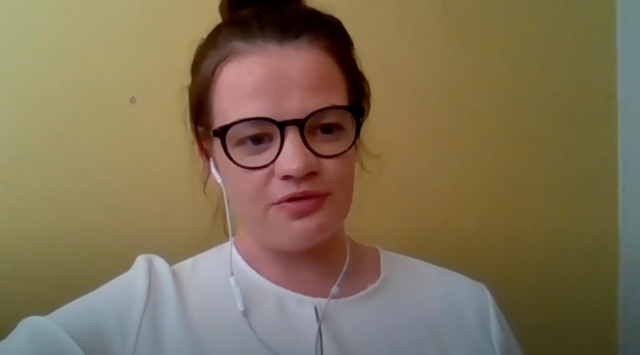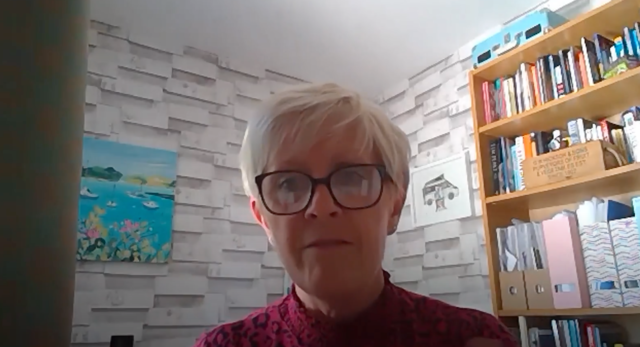COVID-19 is having a huge impact on the Liverpool City Region, particularly affecting vulnerable people like the elderly. We wanted to learn more about what local innovators have been doing to keep at-risk communities safe and connected through technology, so we held a virtual roundtable, Tech Can Save Us, to hear from some amazing guest speakers.
Dawn Paine, Co-Founder and Director at The Extraordinary Club, hosted the discussion as our speakers James Chapman from Safe Steps, Katie Dean from Liverpool Combined Authority and Tracy Paine from belong gave their insights on what they’ve been doing to help during the coronavirus crisis. We also heard from our MD, Jen Fenner, who spoke about our Push To Talk project and how we plan to develop it further.
Let’s discover how these industry professionals are pioneering for tech for good.
James Chapman, MD of Safe Steps
First up was James Chapman, MD and Co-Founder of Safe Steps. James shared his insights on how Safe Steps have adapted their falls-monitoring app in response to the virus to be a COVID-19 clinical data tracker.

Safe Step’s clinical data tracking app is being used to collect information on care home residents in real-time, finding out whether they have symptoms of COVID-19. The information that is collected through the app then feeds through to clinicians and the NHS. The app acts as a vital window into care homes for people that are unable to visit residents for themselves. This innovative use of accessible technology gives NHS teams the best possible chance of helping care homes through the coronavirus outbreak.
Safe Steps launched the app over six weeks ago in Tameside, South Manchester. Since then it has rolled out into Stockport, Bury, and Bolton, and is on track to be used in all 560 care homes across Greater Manchester.
“CV19 progresses very quickly, but with the Safe Steps app we (primary care) can easily identify those patients that need advanced care planning by picking up signs of deterioration as soon as they start to happen.”
– Dr Saif Ahmed, NHS Senior Officer for frailty & digital, Greater Manchester Health & Care Partnership
Katie Dean, Economist for the Liverpool Combined Authority

Next up, Katie Dean talked through what the Liverpool Combined Authority (LCA) is planning to do to help support at-risk communities during COVID-19 and beyond.
Prior to the pandemic, the LCA was looking into creating an ecosystem that strongly involved tech for good. They have since shifted their focus to working on a future innovation fund as part of their emergency response to the virus. The funding will support tech for good businesses like Safe Steps and allow them to continue helping the local community. Using an iterative approach, the funding will be released in a phased manner so it can be refined as it evolves.
‘We can’t save all of our businesses, but we can support the businesses that are making a massive difference’
– Katie Dean, Economist for Liverpool Combined Authority
Tracy Paine, Deputy CEO of Belong

We then heard from Tracy Paine, the Deputy CEO of Belong, speaking about how they are applying technology across their portfolio of retirement villages to support their elderly residents.
Belong is a not-for-profit organisation that operates several care home villages across the North West, providing general and specialist care for the elderly and people with dementia. They currently have seven villages and are in the process of building two more. Due to the coronavirus outbreak, they had to make the difficult decision to close their villages to the public.
They are now using electronic care planning through ‘Person Centred Software’. Using this software allows Belong to show families of residents the progress of someone’s care, as well as photos and videos of them. They’re also recording all of the COVID-19 symptoms that show up in their residents. Unfortunately, Belong has seen a number of COVID-19-related deaths in some of their care villages so they are closely monitoring every resident that shows even the most minor symptoms.
Another challenge they’ve faced is keeping their residents entertained without visits from family and friends. To combat this, they’ve uploaded exercises on YouTube to stream into the households, used Alexa to play music, held virtual birthday parties and encouraged residents to take part in virtual zoo tours. They’re looking at Push to Talk as a way to further connect their residents to the outside world.
Belong have also used technology to drive recruitment, holding virtual interviews. They’ve managed to recruit over 90 new staff members over the last 12 weeks and are looking into online training options such as webinars.
Jen Fenner, MD and Co-Founder of DefProc

Last up was our MD, Jen, who discussed how our project Push to Talk is helping lonely and vulnerable people during the crisis.
Jen went over how Push to Talk can be used to substitute those little day-to-day interactions that lift people’s moods, like chatting to a shop assistant. Push to Talk allows elderly and isolated people to have as many connections as they want from the push of a button.
As part of our own COVID-19 pivot, we’ve developed an app as part of the 5G project in response to the feedback we’ve had. We’re working with an organisation called Local Solutions who look after unpaid carers. Pre-COVID, a lot of those carers were already isolated, didn’t get to see as many people as they’d like to and felt guilty for going out. It made sense for those people who have a smartphone to have access to the app quickly, so it has been running for the last 4 weeks. We’ve had lots of interest and are looking to move Push to Talk to the same stage as the app.
Watch the webinar in full
Get involved with Push To Talk
We hope you enjoyed hearing about our roundtable! If you want to learn more about Push to Talk and get involved in the project, discover how you can help.
Follow DefProc on Twitter and connect with Jen and Patrick on LinkedIn.

